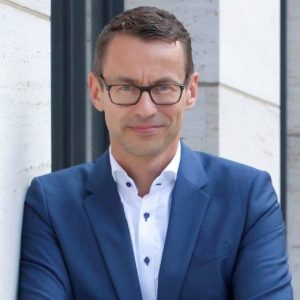How People-Sustainability Is Key to Business Success

A business person walks in an urban building. The foundation of sustainable people management is providing jobs that allow people to earn a decent living and redesigning work to be more human-centric.
Photo: Kokouu / Getty Images
COVID-19 made clear the interdependence of healthy societies, economies and the environment. It exposed the glaring gaps and unmet needs — including precarious health care access and reduced job prospects — that weigh on many people’s futures. Indeed, the “great resignation” is evidence of failing the workforce.
At the same time, the pandemic showed businesses what is possible and desirable in resetting the future of work agenda, from digitization to flexible working, but anchored in stakeholder capitalism goals. Despite COVID-19 disruptions, two in five organizations are continuing their environmental, social and governance (ESG) journey and one in five have even accelerated the shift toward an ESG and multi-stakeholder approach.
As organizations busily reinvent themselves, anticipating and fulfilling unmet social and environmental needs is emerging as a collective priority.
Organizations want and need to ensure sustainability is at the heart of business transformation — from company purpose, work standards and investment strategies to circular economy aspirations, environmental impact and supply chain standards. One way organizations are doing this is by committing to new work standards. The challenge now is for organizations to live by these commitments day to day, office by office.
The Pressure Is On to Take Action on E, S and G
The ESG agenda began to gain momentum with “G” in the wake of governance scandals such as Enron in 2001 and, later, the global financial crisis. Then came companies taking incremental steps on “E,” such as publishing sustainability reports. Latterly, sustainability is increasingly included in the target agreements of top executives (ESG metrics) along with a slew of diversity initiatives. While the “S” (social) aspect of ESG has received less attention to date, emphasis is broadening from “E” toward a balance of all three components.
What is clear is that there is no environmental sustainability without social sustainability, and vice versa.
Hence, many organizations are embarking on their journey to become sustainable at the core — in other words, transforming to deliver every area of the business in line with sustainability principles.
People sustainability means treating people responsibly, taking care of people’s physical and mental well-being and valuing talent for their contribution.
Embed Sustainability Into Your DNA — Employees Are Part of the Solution
Business transformation starts with making sustainability part of an organization’s purpose. While that purpose can be aspirational, it must also be anchored in the business’s strategy, true to its identity, and achievable through the company’s products, services and people. To this effect, transformation must be rooted in people practices that drive and enable change. For example, nearly half (44%) of North American organizations use or are considering the use of ESG and DEI metrics in their incentive plans.
That said, embedding ESG goals must become a much broader exercise than executive incentives or top-down goal alignment — it needs to cover and engage the entire workforce in the talent ecosystem. Discussing and adapting people’s objectives plays a very important role in translating sustainability into employees’ behavior. All this can succeed only if the entire transformation is based on employee listening, co-creation, transparency and trust.
Nurture People Sustainability As a Key Part of the ‘S’ in ESG
A recent survey found that HR and risk managers rank talent attraction, retention and engagement and workforce exhaustion as the most pressing people risks, after cybersecurity. People’s confidence in being able to afford health care has dropped over the last two years: Globally, 24% of the workforce is not confident they can afford the health care their family needs.
Becoming sustainable at the core means addressing the social dimension of sustainability within an organization, its business ecosystem and the communities in which it operates. People sustainability means treating people responsibly, taking care of people’s physical and mental well-being and valuing talent for their contribution.
The “S” will look different for each organization, depending on its workforce model. Still, the imperative extends through the entire talent ecosystem, from employees to gig workers, freelancers, partnership talent and workers in the supply chain.
Elements of Sustainability
Employment foundation: The foundation of sustainable people management is providing jobs that allow people to earn a decent living and redesigning work to be more human-centric.
- Health: Companies are looking at the strategies and tools they can deploy to support physical and mental health. Leading companies are challenging themselves over whether their global benefit offerings meet the diverse needs of their people and reinforce company values, or if they can identify which employee populations are in need of health and wealth protection.
- Wealth: Given the impact of 2020 on wealth disparities, companies are thinking anew about protecting all workers’ well-being, including exploring benefits platforms for gig workers, data on hourly compensation and testing pension outcomes against living pension levels.
- Development: Ensuring employees’ bright futures means supporting their development. Progressive organizations are embracing new work models based on skills and infusing them with heightened employment standards.
- Diversity, equity and inclusion (DEI): Integrating DEI considerations, such as gender pay equity analysis and remediation, across all people practices is an integral part of people sustainability. Yet, diversity is just one aspect of DEI. Equity and inclusion are equally, if not more, important. Equity fosters an environment where all individuals have equal access to opportunities, experiences, development and rewards. An inclusive organization is one where each person feels a sense of belonging.
Align Toward Stakeholder Capitalism
Organizations want to prioritize risk and return, but also balance reputational considerations to align financial value and core values — by, say, ensuring pension plan investments are consistent with environmental and social goals.
COVID-19 has also amplified the need for a strong governance model, effective execution and agility in periods of heightened volatility. Many pension plan sponsors are also being asked to do more with less: They have fewer dedicated resources, yet need a greater sensitivity to market changes. Technological disruption is changing the risk-return curve rapidly, in climate-related investments in particular, so even if investors integrated ESG two years ago, they need to reassess portfolios today.
For some, the answer is outsourcing to help organizations get on the pathway to sustainable investments. Trendsetters and advanced investors deliver performance through a long-term stakeholder-centric approach, integrating ESG to add rigor and depth to investment processes and risk management.
Seeding Bright Futures
In some quarters, there is still a temptation to delay action for longer-term impact. But progressive organizations are being proactive — rethinking, reinventing and transforming to build sustainable futures for multiple stakeholders. Becoming intrinsically sustainable requires a reset of everything and engaging the workforce in the transformation. In return, companies will open up new business models, new avenues of competitive advantage, responsible investment strategies, and heightened work standards that, together, will ensure people and societies survive and thrive.







